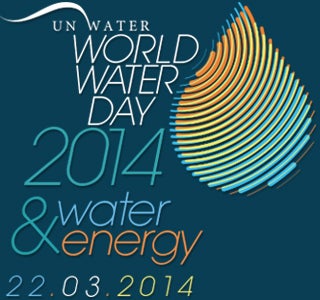
Three and a half years into a cholera epidemic that has claimed more than 8,500 lives, Haiti has made significant progress in slowing the spread of the disease. PAHO and coalition partners urge stepped-up investments in water and sanitation.
PAHO and coalition partners urge stepped-up support for call to action launched in 2012
Washington, D.C., 21 March 2014 (PAHO/WHO) — Three and a half years into a cholera epidemic that has claimed more than 8,500 lives, Haiti has made significant progress in slowing the spread of the disease. However, controlling and eventually eliminating cholera will require major improvements in water and sanitation infrastructure, said representatives of the Pan American Health Organization (PAHO) and its partner organizations in the Regional Coalition for Water and Sanitation to Eliminate Cholera from Hispaniola.
 "World Water Day is an opportunity to highlight how critical water
and sanitation are in the fight against cholera," said PAHO Deputy Director Jon
K. Andrus. "This was a key lesson learned in stopping the cholera epidemic that
swept the Western Hemisphere in the 1990s. During that time, countries
prioritized safe water and sanitation as fundamental to stopping cholera
transmission while ensuring access to safe water as a basic human right."
"World Water Day is an opportunity to highlight how critical water
and sanitation are in the fight against cholera," said PAHO Deputy Director Jon
K. Andrus. "This was a key lesson learned in stopping the cholera epidemic that
swept the Western Hemisphere in the 1990s. During that time, countries
prioritized safe water and sanitation as fundamental to stopping cholera
transmission while ensuring access to safe water as a basic human right."
"We want to go far beyond treating cholera patients. We want to stop the actual transmission of cholera in Haiti, the Dominican Republic, and elsewhere, and to get there we need major improvements in water, sanitation and hygiene," said John Oldfield, CEO of WASH Advocates.
Since October 2010, cholera has spread to all of Haiti's departments, into the neighboring Dominican Republic, and beyond the island of Hispaniola to Cuba and Mexico. In Haiti alone, more than 700,000 people have been sickened by cholera and more than 8,500 have died (as of mid-March 2014). Although the epidemic has slowed considerably, cholera has continued to sicken an average of 385 people per week in Haiti during 2014.
Even before the January 2010 earthquake, Haiti had the lowest levels of water and sanitation coverage in the Americas, with only 63% of the population having access to improved sources of drinking water, and 17% having access to improved sanitation. These conditions facilitated the rapid spread of cholera after its initial outbreak in October 2010.
To fight the epidemic, the governments of Haiti and the Dominican Republic in 2012 launched a "Call to Action" for the international community to support major improvements in safe water, sanitation, and hygiene. PAHO and several partners formed the Regional Coalition for Water and Sanitation to Eliminate Cholera from Hispaniola to mobilize international support for the two countries' efforts in this area.
Together with other members of the Regional Coalition, PAHO has provided technical support that has included:
- Establishing a water-quality monitoring system that has been implemented in 56 health centers and that is being expanded to all of Haiti's 140 communes.
- Strengthening the capacity of sanitary officers from Haiti's Ministry of Health and Population (MSPP) to undertake water disinfection and to manage and distribute water treatment supplies.
- Decontaminating water in cholera treatment centers during outbreaks, evaluating the water and sanitation infrastructure in health facilities, and rehabilitating water and sanitation infrastructure in 10 Haitian health centers.
- Providing technical support for the development of national plans in both Haiti and the Dominican Republic to eliminate cholera through actions to improve water, sanitation, and hygiene as well as disease surveillance and control.
Andrus and other members of the coalition say that further improvements in water and sanitation are not only necessary to advance toward elimination of cholera and prevent its spread to other countries, but will also have important spill-over effects.
"If we stop cholera transmission by investing in water and sanitation, we will also help prevent other causes of waterborne, childhood-killer diarrheal diseases," said PAHO Deputy Director Jon Andrus. "The secondary benefits will be enormous, not to mention economic growth, higher productivity, and greater national stability in Haiti."
"Safe water is medicine. Toilets are medicine. Water and sanitation don't just treat disease; they prevent the spread of cholera in the first place. Every man, woman and child in Haiti and beyond deserves access to safe drinking water and sanitation," said WASH Advocates CEO John Oldfield. "This is not just essential to prevent cholera. It is every person's basic human right."
The Regional Coalition for Water and Sanitation to Eliminate Cholera from Hispaniola is made up of 20 multilateral, bilateral and nongovernmental organizations. In addition to PAHO and WASH Advocates, other members include the U.S. Centers for Disease Control and Prevention (CDC), Catholic Relief Services, the Inter-American Development Bank, the Spanish Agency for International Cooperation and Development (AECID), the Millennium Water Alliance (MWA), USAID, UNICEF, and World Vision (for a complete list of members visit: https://www.paho.org/coleracoalicion/?page_id=7).
PAHO, founded in 1902, is the oldest international public health organization in the world. It works with its member countries to improve the health and the quality of life of the people of the Americas. It also serves as the Regional Office for the Americas of WHO.
Links
- Regional Coalition for Water and Sanitation to Eliminate Cholera in Hispaniola
- WASH Advocates/World Water Day
- World Water Day/U.N.
- http://www.paho.org
- https://www.facebook.com/PAHOWHO
- https://www.youtube.com/pahopin
- https://twitter.com/pahoeoc
- https://twitter.com/pahowho
- https://twitter.com/opsoms
Media Contacts:
Leticia Linn, linnl@paho.org, Tel. + 202 974 3440, Mobile +1 202 701 4005, Donna Eberwine-Villagran, eberwind@paho.org, Tel. +1 202 974 3122, Mobile +1 202 316 5469, Sebastián Oliel, oliels@paho.org, Phone +1 202 974 3459, Mobile 202 316 5679, Knowledge Management and Communications, PAHO/WHO—www.paho.org



